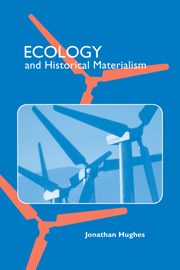Book contents
- Frontmatter
- Contents
- Acknowledgements
- Introduction
- 1 Ecological problems: definition and evaluation
- 2 Marxism and the green Malthusians
- 3 Marxism and the ecological method
- 4 Historical materialism: locating society in nature
- 5 Development of the productive forces
- 6 Capitalism, socialism and the satisfaction of needs
- Conclusion
- References
- Index
Conclusion
Published online by Cambridge University Press: 22 September 2009
- Frontmatter
- Contents
- Acknowledgements
- Introduction
- 1 Ecological problems: definition and evaluation
- 2 Marxism and the green Malthusians
- 3 Marxism and the ecological method
- 4 Historical materialism: locating society in nature
- 5 Development of the productive forces
- 6 Capitalism, socialism and the satisfaction of needs
- Conclusion
- References
- Index
Summary
What I have argued in this book is that, contrary to the contentions of many environmental commentators, the main commitments of Marx's theory of historical materialism can plausibly be interpreted in a manner that is compatible with a recognition of environmental problems and constraints. I have suggested, moreover, that Marx's account of the ways in which human societies depend upon and are influenced by their natural environments, both at a macro-level (historical materialism) and at a micro-level (conception of the labour process), offers a helpful framework within which to investigate the causes and solutions of ecological problems.
At the heart of my argument is what may be termed a qualitative interpretation of Marx's notion of the development of the productive forces. According to this interpretation, development of the productive forces is not a unilinear or one-dimensional process. There is no single path that it must follow, and no single substantive criterion against which all such developments can be measured. The one feature that all developments of the productive forces share, and which qualifies them as such, is that in some way they contribute to the solution of problems faced by human beings or to the furtherance of their interests; but these interests and problems vary according to material and social circumstances and between different groups in society.
- Type
- Chapter
- Information
- Ecology and Historical Materialism , pp. 201 - 207Publisher: Cambridge University PressPrint publication year: 2000

